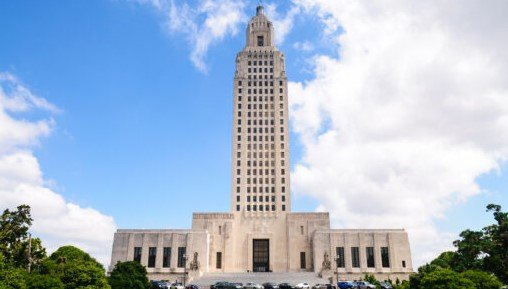Louisiana lawmakers are grappling with how to fund Governor Jeff Landry’s plan to slash state income taxes without cutting vital public services. The proposed income tax reduction could cost the state more than $1 billion annually, prompting a search for new revenue sources, including a higher sales tax or corporate tax changes.
Landry’s Tax Cut Proposal Faces Financial Hurdles
Gov. Jeff Landry’s proposal to cut personal income taxes has quickly shifted from an ambitious overhaul to a more modest plan, as lawmakers seek ways to make it financially viable. Landry’s original vision included reducing the state’s top personal income tax rate to a flat 3%, down from the current rate of 4.25%. While the idea has strong support from the governor, it comes with a hefty price tag that many lawmakers are questioning.
Landry’s plan would cost Louisiana over $1 billion in lost revenue each year, leaving the state approximately $700 million short of what is necessary to maintain current government spending levels. Despite these financial challenges, legislators have expressed interest in cutting income taxes but are now focused on finding ways to offset the lost revenue.

A Struggle to Find Solutions
The governor’s initial plan was designed to streamline the tax system by broadening the sales tax base and cutting both personal and corporate income taxes. By eliminating certain business tax breaks and expanding the sales tax to include more services, the proposal aimed to generate enough revenue to support tax cuts. But as the debate unfolds, lawmakers have grown hesitant about some of these trade-offs, particularly extending sales taxes to more services like lawn care, home repairs, and even dog grooming.
The Louisiana House of Representatives rejected this plan last week, citing concerns about the impact on consumers and businesses. The proposed sales tax expansion was projected to raise around $500 million, but many legislators felt it was too much of a burden on the public.
Corporate Taxes and Business Incentives at the Center of Debate
Another significant sticking point has been the fate of Louisiana’s business incentive programs, which cost the state hundreds of millions of dollars annually. Lawmakers have expressed reluctance to fully rollback these programs, which include tax credits for the film industry and historic preservation. While the Senate has yet to approve such cuts, some proposals have been delayed, such as a plan to eliminate a state inventory tax credit and increase taxes on machinery used by industrial employers.
Without these revenue-generating measures, Landry’s tax cut proposal could face serious opposition, with many drawing comparisons to the failed policies of former Governor Bobby Jindal. Jindal’s attempts to cut income taxes without finding a sustainable revenue source led to long-term budget issues, and lawmakers are cautious not to repeat that mistake.
A Possible Sales Tax Increase as a Solution?
With no clear path to cover the $1 billion shortfall, Senate leaders have suggested increasing the state’s sales tax to help fund the tax cuts. Currently, Louisiana’s sales tax rate is set to drop from 4.45% to 4% in July. However, Landry has proposed keeping the extra 0.45% indefinitely, which could help fund the cuts to personal and corporate income taxes. Now, some lawmakers are floating the idea of a 5% sales tax rate to fill the funding gap.
Increasing the sales tax rate, though, would have significant implications. Louisiana already has one of the highest average sales tax rates in the country, which places a larger financial burden on low-income households. These families, who do not pay income taxes, would not benefit from the proposed income tax cuts, making the plan more regressive.
Growing Divisions Within the Legislature
While some Republicans, especially in the Senate, favor a higher sales tax rate, others are less enthusiastic about it. The state’s sales tax rate is already a point of contention, and there is concern that raising it further would alienate voters. In fact, a proposal to keep the sales tax at 4.4% barely passed the House last week, with just two votes to spare.
Rep. Matthew Willard, a Democrat from New Orleans, raised concerns about the fairness of a higher sales tax. “As soon as you start to increase the sales tax more, the plan becomes more regressive,” he warned. His comments reflect the growing divide within the legislature over how to balance the desire for tax cuts with the need to fund essential services.
The Road Ahead for Landry’s Tax Plan
For now, Landry’s proposal remains in limbo as lawmakers continue to search for ways to make the math work. The debate over Louisiana’s tax structure is likely to continue into 2025, with both sides weighing the costs and benefits of different approaches. The governor’s desire to lower income taxes is clear, but finding a sustainable way to do so without crippling the state’s finances is proving to be a formidable challenge.
As the state navigates these difficult decisions, the outcome of the tax debate will have significant consequences for Louisiana’s future budget and economy. Lawmakers will have to balance the needs of the public with the demands of tax reform, and finding a solution that works for everyone will be no easy task.

Comments